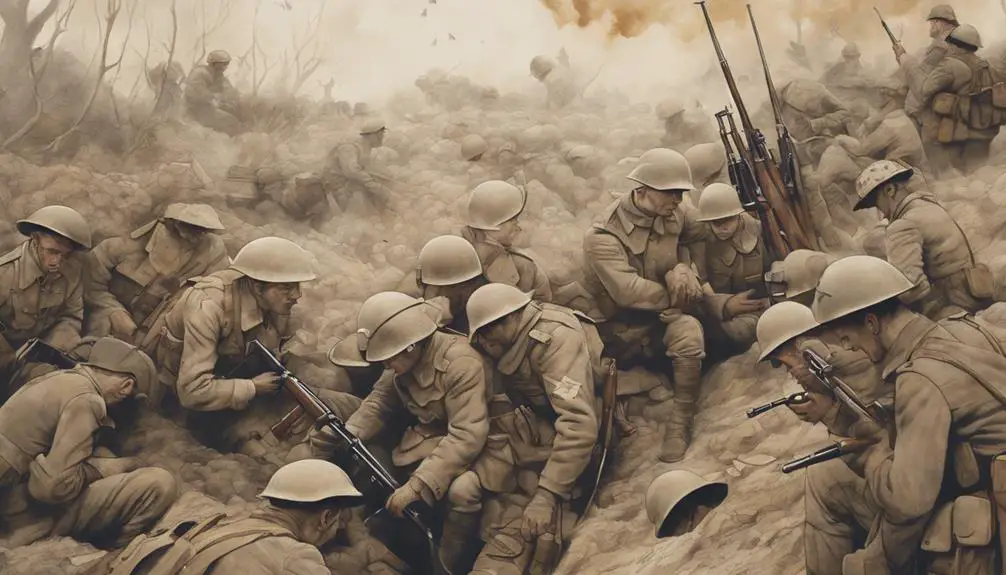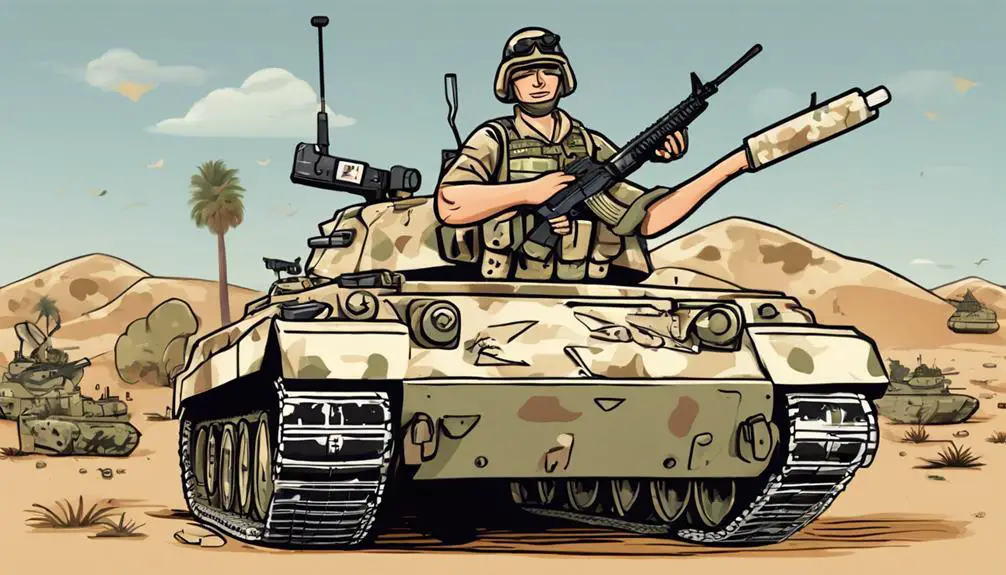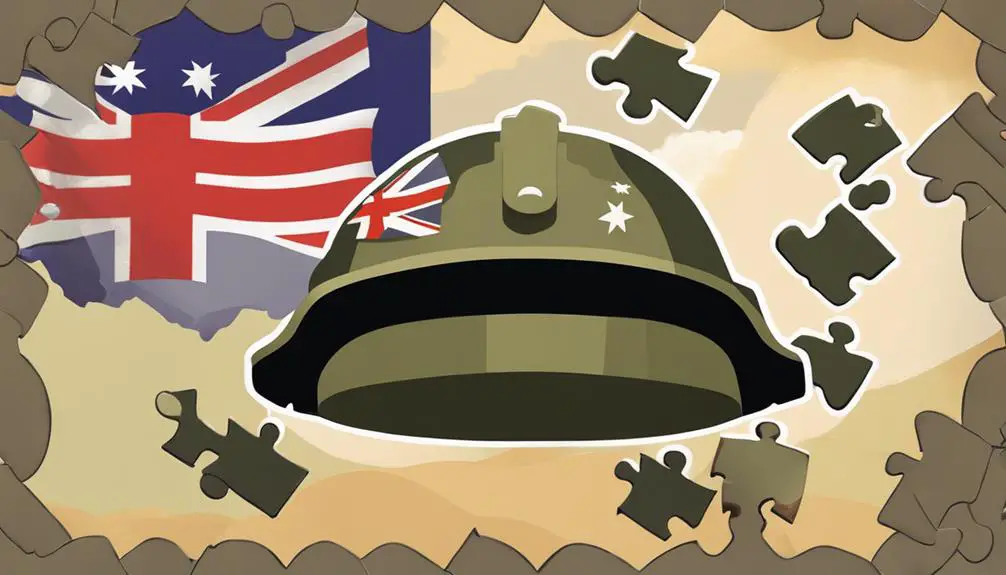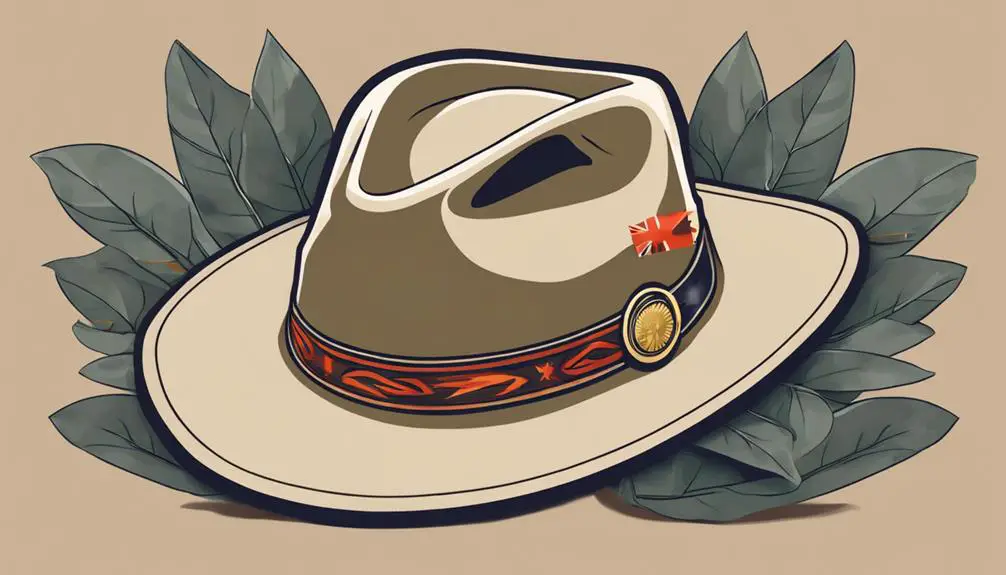You've likely heard Aussie slang phrases like 'fair dinkum' and 'she'll be right' in casual conversations, but did you know that Australian military slang has a rich history that dates back to World War I, when soldiers created their own unique language to communicate efficiently and avoid enemy detection on the battlefield. This coded language was born in the trenches, where colloquialisms and abbreviations enabled troops to convey crucial information quickly. As you explore the world of Australian military slang, you'll discover a complex web of terms and codes that reveal a deeper understanding of the Australian Defence Force's culture and community.
Slang Born on the Battlefield

Fighting on foreign soil, Australian soldiers have been coining slang terms in the heat of battle since World War I.
You might be surprised to learn that many Aussie slang words originated in the trenches, where soldiers created their own dialect to cope with the chaos and uncertainty of war. This unique language, born out of necessity, helped troops communicate quickly and efficiently on the battlefield.
In the heat of battle, soldiers relied on coded language to convey vital information, often using colloquialisms and abbreviations to avoid detection by the enemy.
This war dialectic, shaped by the harsh realities of combat, gave rise to distinctively Australian phrases that eventually made their way back home.
You'll find that many of these battlefield-born terms have become an integral part of Australian military culture, reflecting the country's rich history of military service.
As you explore further into the world of Australian military slang, you'll discover how the harsh realities of war gave birth to a unique and colorful language that continues to evolve to this day.
Aussie Slang in Everyday Use
You'll often hear Aussie slang phrases being tossed around in casual conversations, from the pub to the footy stadium, as this unique language has seamlessly woven its way into everyday Australian life.
As you navigate the streets of Sydney or Melbourne, you'll notice how effortlessly locals switch between standard English and their beloved slang. It's not uncommon to hear someone order a 'flat white' (a type of coffee) or ask a mate to 'chuck a snag on the barbie' (put a sausage on the barbecue).
This local lingo has become an integral part of Australian cultural identity, reflecting the country's laid-back and humorous nature. In fact, using Aussie slang is a way for Australians to assert their cultural identity and connect with their heritage.
Whether you're at the beach or at a backyard barbecue, you'll find that Aussie slang is an essential part of the local dialect, adding flavor and charm to everyday conversations.
Military Humor and Nicknames

As you explore the Australian military, you'll discover a unique brand of humor that permeates the ranks, often manifesting in colorful nicknames and witty banter that serve as a coping mechanism for the stresses of military life.
This humor, known as Battlefield Banter, is an essential part of military culture, helping to build camaraderie and relieve tension in high-pressure situations.
Nicknames, in particular, play a significant role in this humor, often originating from a person's appearance, habits, or quirks.
For instance, a soldier with a large nose might be dubbed 'Concorde' or 'Schnoz.'
Nickname Origins can be as simple as a play on a person's surname or a characteristic that sets them apart.
These nicknames become an integral part of a soldier's identity, fostering a sense of belonging and unity within the unit.
Colloquialisms in the Ranks
Within the Australian military, colloquialisms permeate everyday conversation, with soldiers frequently tossing around terms like 'fair dinkum' (genuine) and 'she'll be right' (it's all good) to convey a laid-back, no-nonsense attitude. You'll often hear these colloquialisms in the ranks, where they're used to build camaraderie and establish a sense of belonging. In the Ranks hierarchy, colloquialisms serve as a way to bridge the gap between officers and enlisted personnel, creating a sense of unity and shared experience.
Military lingo is woven into the fabric of daily life in the Australian Defence Force (ADF). You'll hear soldiers using terms like 'sanga' (sandwich) and 'arvo' (afternoon) to describe everyday things. These colloquialisms are more than just slang – they're a way to assert one's identity as a member of the military community. By using these terms, soldiers signal that they're part of an exclusive group, one that values loyalty, hard work, and a commitment to serving their country.
As you navigate the Ranks hierarchy, you'll come to realize that these colloquialisms are an integral part of the military's cultural fabric.
Decoding the ADF Lexicon

To explore the nuances of military communication, it's important to understand the unique lexicon that permeates the Australian Defence Force, where colloquialisms like 'sanga' and 'arvo' are just the tip of the iceberg.
As you investigate further into the ADF's linguistic landscape, you'll encounter a complex web of acronyms, abbreviations, and slang terms that can be challenging for outsiders.
To crack the code, you'll need to become a Code Breaker, able to decipher the subtle differences between terms like 'ops' (operations) and 'opso' (operational). You'll also need to recognize the Lexicon Legends, those veterans who've mastered the art of military communication and can converse fluently in the ADF's unique dialect.
As you navigate the ADF lexicon, you'll discover a rich cultural heritage that reflects the Force's history, values, and sense of humor. By mastering this lexicon, you'll gain a deeper understanding of the ADF's inner workings and be better equipped to communicate effectively with its personnel.
Frequently Asked Questions
Are There Any Australian Military Slang Words Derived From Indigenous Languages?
You're curious about the origin of Australian military slang words.
Surprisingly, some terms do come from Indigenous languages. For instance, Yolngu terms from North East Arnhem Land have been incorporated into military vocabulary.
Similarly, Warlpiri phrases from the Northern Territory have also been adopted. These borrowed words often relate to navigation, terrain, and environment, reflecting the historical connection between Indigenous Australians and the land.
You'll find these unique terms scattered throughout Australian military history and operations.
Is Australian Military Slang Used by Other English-Speaking Countries' Armies?
Are you curious about whether military slang crosses borders? You're not alone!
The answer is yes, Anglo adaptation plays a significant role in the adoption of slang across English-speaking countries' armies. Cross-cultural exchange and shared military experiences have contributed to the spread of colloquialisms.
While Australian military slang has its unique flavor, other English-speaking countries' armies have borrowed and adapted terms, creating a shared linguistic landscape.
Do Officers Use Different Slang Than Enlisted Personnel in the Adf?
You might wonder if officers use different slang than enlisted personnel in the ADF.
In many militaries, rank dialectics play a significant role in shaping language use. Officer lingo, for instance, may include more formal or technical terms, whereas enlisted personnel might use more colloquial expressions.
In the ADF, this distinction is less pronounced, but officers may still use more formal language, while enlisted personnel might use more informal slang.
Can Civilians Use Australian Military Slang Without Being Offensive?
You might be surprised to know that 75% of people have used slang from a culture that's not their own.
Now, when it comes to using Australian military slang, you're probably wondering if it's okay as a civilian. The answer lies in cultural appropriation.
Using military slang without understanding its origins or significance can be seen as disrespectful. It's essential to be mindful of social norms and avoid using terms that might be sacred to the military community.
Be respectful, and you'll be right as rain!
Are There Any Australian Military Slang Words That Have Become Obsolete?
You might be surprised to learn that many words and phrases fall out of favor over time, becoming forgotten phrases or lost lingo. As language evolves, outdated expressions and vintage vocab give way to new terminology.
It's no different in the military, where slang can be particularly ephemeral. In the Australian military, some slang words have become obsolete, replaced by newer terms that better suit the needs of modern soldiers.
Conclusion
You've now got a crash course in Australian military slang, and let's be real, you're basically a pro at decoding the ADF lexicon.
You can toss around 'fair dinkum' and 'chuck a sickie' like a seasoned vet.
But here's the thing: it's not just about the slang – it's about the camaraderie, the humor, and the unwritten rules that bind Aussie military personnel together.
So, go ahead, throw some military slang into your everyday convo, but remember, it's not just words – it's a way of life.







